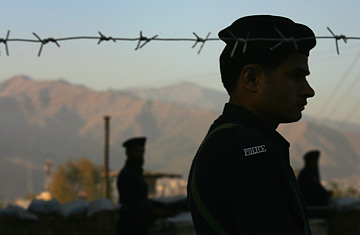
Pakistani police stand vigil in Mingora in the Swat Valley of Pakistan, November 18, 2007
(2 of 2)
The problem, says the Western military official, is that the Pakistani soldiers are undertrained and outgunned. He puts himself in the soldiers' boots: "I'm making $20 a month, I've got five bullets in my gun, and a couple of guys with AKs come up. I mean the question is, do I want to die? Oh, and by the way — they know all my family."
The Pakistani military, which came of age fighting archrival India on more conventional battlegrounds, is little prepared to face a classic guerrilla insurgency. While some of Swat's militants are foreign, the majority are home-grown, nourished on local antipathy to a government that doesn't represent their wishes, and allowed to fester by political parties loath to alienate the religious vote by cracking down on demands for Sharia. "The people want the militancy to stop," says Adnan Aurangzeb, a former member of Parliament from Swat, and the grandson of the valley's last princely ruler. "The militants have stopped tourism and disrupted their lives, but the government doesn't have the people's sympathy either." A military crackdown, and the inevitable civilian casualties, will only estrange the people further. "This is the kind of counterinsurgency training that the military lacks," says the military official. "There has got to be a strong information campaign to go along with the kinetics [military force]. Fazlullah has a FM station? Jam the damn thing. They sure as hell can jam stations here [in Islamabad], so why can't they do that up there?"
Fazlullah, a local student who once earned a living ferrying passengers and goods across the Swat river, got his start studying under Maulana Sufi Muhammad, a religious teacher who founded the Tehrik Nifaz Shariat-e-Muhammaidi (Movement for the Enforcement of Islamic Law) in the 1990s. In 2002, TNSM was banned, and Muhammad thrown in jail for mobilizing thousands of his followers to fight American forces in Afghanistan. Fazlullah, by then his son-in-law, continued the campaign for Sharia using the platform of his popular radio show.
Now the government has released Muhammad, in hopes that he can help calm the situation. Shuja calls it part of the "political effort" needed to accompany the military campaign. "Brute use of force alone would only take us backwards." That may be so, but releasing a known anti-government campaigner seems like a desperate gamble — one that the government may already be losing. "He is our leader and very dear to all of us, but our struggle for the implementation of a true Islamic system will not be affected," says Sirajuddin. "Maulana Sufi is demanding the same. It is good that the government has released him; now it should start work on the implementation of Sharia."
While it is unlikely that the government will ever go that far, the newly appointed Vice Chief of Army Staff, Ashfaq Kyani, who is slated to take over from Musharraf when he retires as army chief, is already taking steps to remedy some of the military's worst problems. On Monday, he visited troops in Swat to raise morale and is taking concrete steps to get them more training and equipment. Even as U.S. military commanders return again and again to well-thumbed counterinsurgency textbooks dating to Vietnam to help with current engagements in Iraq and Afghanistan, Pakistan too has to learn the art of counterinsurgency. "It's going to be a long haul, and we don't have time for a long haul," says the Western military official. Meanwhile, Pakistan's militants aren't waiting.
—With reporting by Shaheen Buneri
